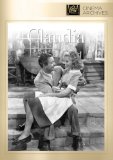| Reviews & Columns |
|
Reviews DVD TV on DVD Blu-ray 4K UHD International DVDs In Theaters Reviews by Studio Video Games Features Collector Series DVDs Easter Egg Database Interviews DVD Talk Radio Feature Articles Columns Anime Talk DVD Savant Horror DVDs The M.O.D. Squad Art House HD Talk Silent DVD
|
DVD Talk Forum |
|
|
| Resources |
|
DVD Price Search Customer Service #'s RCE Info Links |
|
Columns
|
|
|
Claudia (Fox Cinema Archives)
Charming, bittersweet adaptation of the hit Broadway play. Hard-core movie lovers know that the studios' M.O.D. (manufactured on demand) services initiated by Warner Bros.' successful Archive Collection have been an absolute boon to those looking for difficult-to-find library and cult titles not considered commercially viable for mass-market disc printing. So along with Warners, Sony's Columbia vaults and M-G-M, Twentieth Century-Fox joins the M.O.D. market with their Cinema Archives line―and a most welcome addition it is. I've reviewed several of their introductory titles this week (Way of a Gaucho, Suez, The Foxes of Harrow); next up is Claudia, the hit 1943 Fox comedy/drama based on the successful Broadway play by Rose Franken, directed by Edmund Goulding, and starring Dorothy McGuire, Robert Young, Ina Claire, Reginald Gardiner, and Olga Baclanova. A funny, sad look at a screwy child bride finally coming to grips with growing up, Claudia may look stagebound, but it succeeds with its bright writing and its lovely performances. No extras for this only-okay transfer.
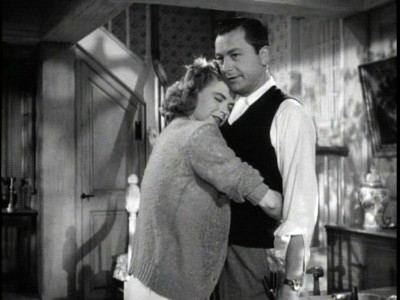
Naughton Farm, outside of Stillbrook, in the wilds of rural Connecticut. Former architect David Naughton (Robert Young) now runs a comfortably rustic egg farm with his child bride, Claudia (Dorothy McGuire). Scraping by as much because of the Depression as because of Claudia's suspect math skills and David's poor stock market acumen, economic tensions are secondary to David's quiet exasperation at his wife's immaturity. Specifically: Claudia's inability to let her witty, bantering mother, Mrs. Brown (Ina Claire), go―both physically and emotionally. Mrs. Brown and David are more than aware of Claudia's refusal to face growing up, a denial by Claudia that gets the delightfully daffy, naïve Claudia into almost serious trouble with serial lady killer Jerry Seymour (Reginald Gardiner), a neighboring author who doesn't realize that flirtatious Claudia really doesn't understand the effect she's having on opportunistic Jerry. Sensing an opportunity to not only help out with the family finances but more importantly, move back to New York City to be closer to her mother, Claudia decides to go along with pushy Russian opera singer Madame Daruschka (Olga Baclanova), who happens to be visiting with Claudia's sister-in-law, Julia (Jean Howard), and sell the farm to the insistent, oblivious singer. This promise spells potential disaster for the Naughton marriage, made more imminent when Claudia's mother becomes ill.
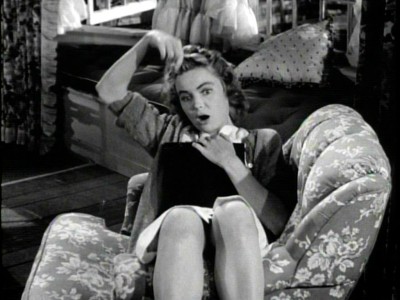
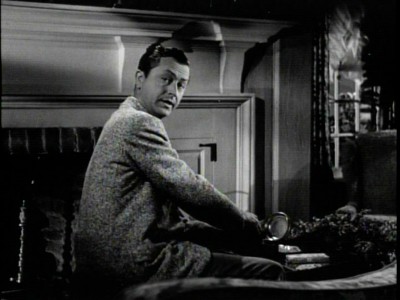
I had never heard of Claudia prior to seeing this disc arrive last week, but apparently, the original story was quite the little money-spinner for its creator, Rose Franken. Franken, a novelist, successfully published Claudia: The Story of A Marriage in 1939, followed by a "sequel" serial, Claudia and David, in Redbook magazine (back when that actually meant something for an author). Positive feedback from the public encouraged Franken to adapt the stories into a play in 1941, where it ran on Broadway for almost two years. 20th Century-Fox bought the rights to the hit play, adapted it into Claudia in 1943, where it proved successful enough for a sequel, Claudia and David, three years later, with McGuire and Young repeating their roles. A radio series then followed, and in 1952, when the expanding television market was seeking out more and more product, the still-popular Claudia books, radio series, play and movies were deemed a solid bet, and Claudia, The Story of a Marriage debuted as a mid-season replacement on NBC, starring Joan McCracken and Hugh Reilly (it only lasted through the summer, being picked up midway by CBS). Clearly, something about this story had continued appeal for audiences back in the 1940s and 1950s, considering it various incarnations.
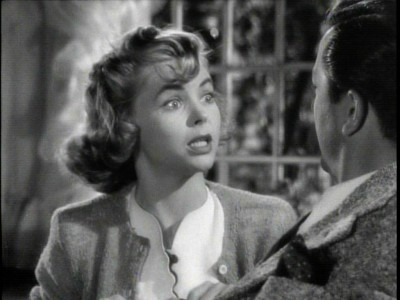
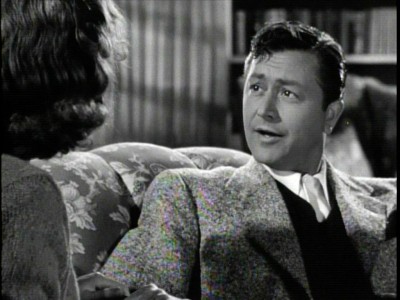
Restricted to just a few studio-bound sets (the mocked-up exterior of the farmhouse, the living room, kitchen, and bedroom), one can't help but feel that Claudia remains resolutely stagebound, with director Edmund Goulding (Grand Hotel, The Razor's Edge, Nightmare Alley), not the most dynamic visualist to begin with, made even more static by the boundaries of the scenario (and most likely the tiny budget, too). Furthering this stagy atmosphere is the reliance on mostly talk and little if any "action" (even the blocking within individual scenes is rather suspended and quiet), giving the viewer the impression that Claudia is more interested in capturing the play's funny dialogue and McGuire's star-making performance...rather than in creating a bona fide movie that operates outside the more rigid, locked-down conventions of a proscenium-framed stagework.
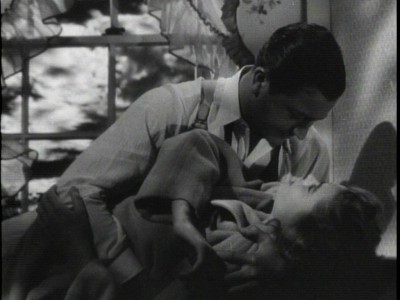
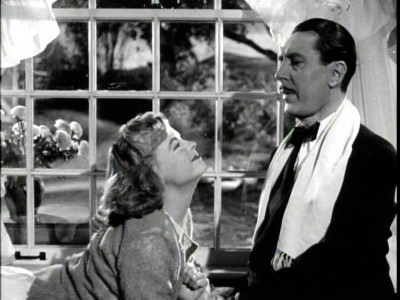
Luckily, that dominating dialogue (and those performances) is quite sparkling, whether they're the original lines by Franken, or ones written for the movie by scripter Morrie Ryskind (The Marx Bros.' Animal Crackers and A Night at the Opera, the classic screwball comedy My Man Godfrey, the solid weeper Penny Serenade). Claudia opens oddly, with a theft of some money from the farm and reluctant David shooing the thief away, an opening necessary to set up the initial bantering of David and Claudia, but one that doesn't really seem to fit in with the rest of the play's themes. After that, Claudia settles down into what we think will be a slightly more sophisticated version of The Egg and I, with snappish repartee between David and Claudia and especially Mrs. Brown replacing slapstick, and McGuire's beguilingly daffy Claudia getting the majority of yocks. The second act goes further, morphing into bedroom farce when the hilarious Gardiner (one of my all-time favorites) comes on the scene, making a play for McGuire, never quite sure if she's putting him on or if she's as naïve as she appears to be, before the movie turns deadly serious for its final act, as the playacting falls away and Claudia realizes she MAJOR SPOILER ALERT! must let go of her beloved, dying mother.
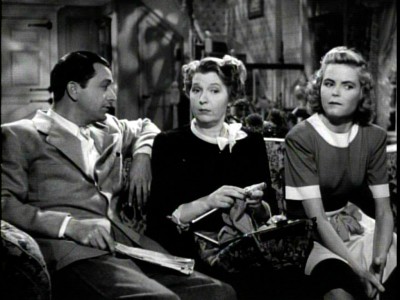
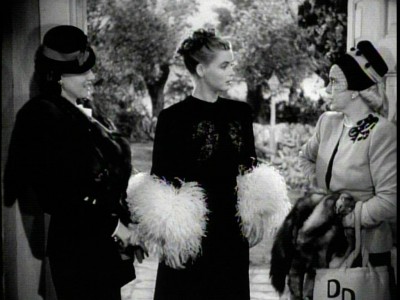
That final section of Claudia is quite moving for what we're primed to think is a light suburban/rural marriage comedy. Claudia's main problem is thought by everyone to be that she was married off too young (even David feels this way); however, it's gradually revealed that the tension in Claudia's and David's marriage stems from her insistent, immature (and tenderly understandable) denial of life's cruelest and most impassive truth―a denial many people have, regardless of their age: that nothing stays the same, no matter how happy you are, no matter how much you want a particular moment of your life to remain frozen in time. Or no matter how much you want someone to stay in your life. David understands this, as does Claudia's mother, but once Claudia faces this at first terrifying thought, she comes to accept it, and even embrace it, as David advises her to. That way, she can stop coveting the time that is passing, and instead make the most of it. Robert Young could play the calm, understanding David in his sleep, and absolutely delectable Ina Claire, the legendary Broadway comedienne, is delicious as Mrs. Brown: breezy, down-to-earth sophisticated, witty and tenderly insouciant (Olga Baclanova, of Freaks fame, recreates her Broadway role here like McGuire, and she's a stitch, too).
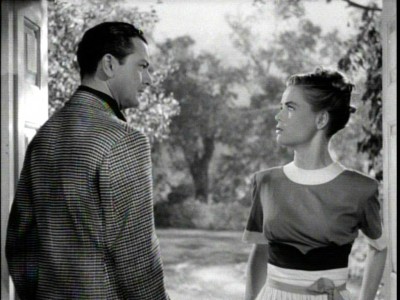
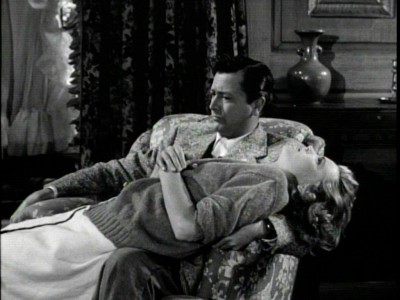
But Claudia really belongs to Dorothy McGuire, in her first motion picture role. At first, the viewer might not quite get the whole "child bride" angle of the play, since at 27, McGuire is hardly passable as an 18-year-old. However, her naturalistic performance, full of believable hesitations and sudden bursts of energy, her willful insistences and painfully hurt reactions, immediately conjure up a woman/child who delights as much as exasperates. McGuire, a quietly gifted, empathetic performer who never seems to get mentioned when the screen greats of her period are listed, pulls off the neat trick here of being believably innocent and pained, and obstinate and paining, in alternating, lightning-fast flashes that always ring true (her best moment has to be on the staircase, when David indicates it's time for bed, and the young McGuire, suddenly not shy at all, dances ahead of him, posing for him, offering views of herself, knowing delightedly that she's going to make love to him―it's remarkably sweet and erotic at the same time). If Claudia the movie seems a little static, her performance (and the others, as well), still seems fresh and true, all these years later.
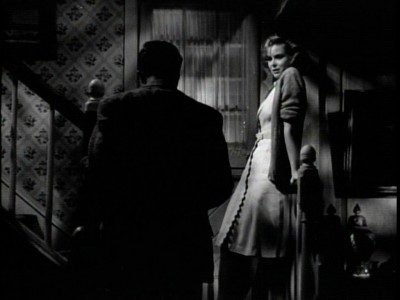
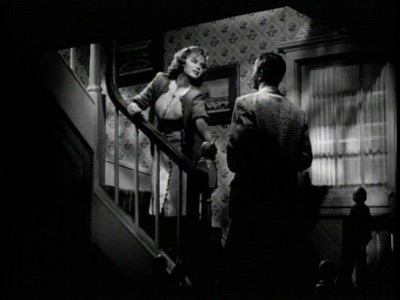
The DVD:
The Video:
The full-screen, 1.37:1 black and white transfer for Claudia looks a tad dark, with moderate grain, moderate dirt, and some contrast issues here and there. Medium-sharp image.
The Audio:
The Dolby Digital English mono audio track has prominent hiss, although the dialogue is relatively clear. No subtitles or closed-captions.
The Extras:
No extras for Claudia.
Final Thoughts:
Sweet and sad, with a stellar performance from Dorothy McGuire in her first movie turn. I'm highly recommending Claudia.
Paul Mavis is an internationally published movie and television historian, a member of the Online Film Critics Society, and the author of The Espionage Filmography.


|
| Popular Reviews |
| Sponsored Links |
|
|
| Sponsored Links |
|
|
| Release List | Reviews | Shop | Newsletter | Forum | DVD Giveaways | Blu-Ray | Advertise |
|
Copyright 2024 DVDTalk.com All Rights Reserved. Legal Info, Privacy Policy, Terms of Use,
Manage Preferences,
Your Privacy Choices | |||||||









